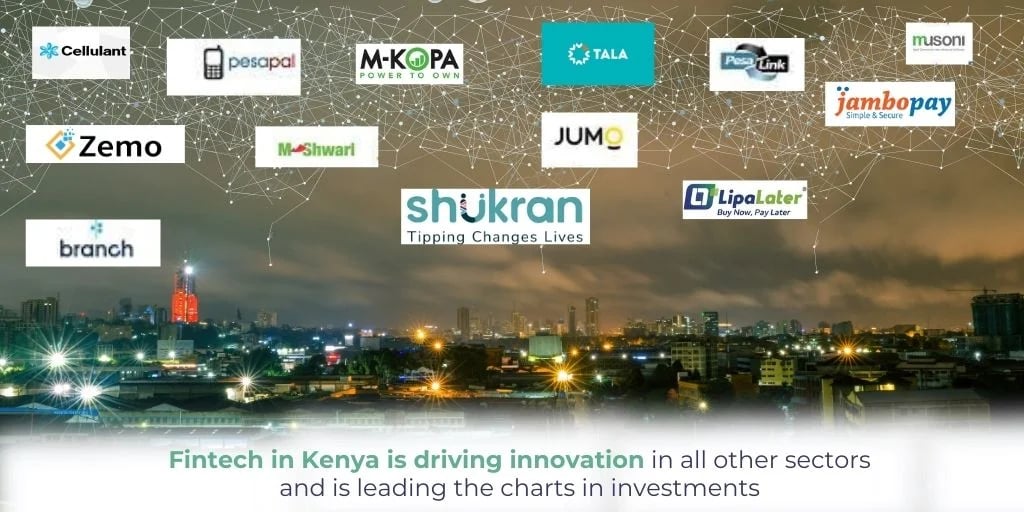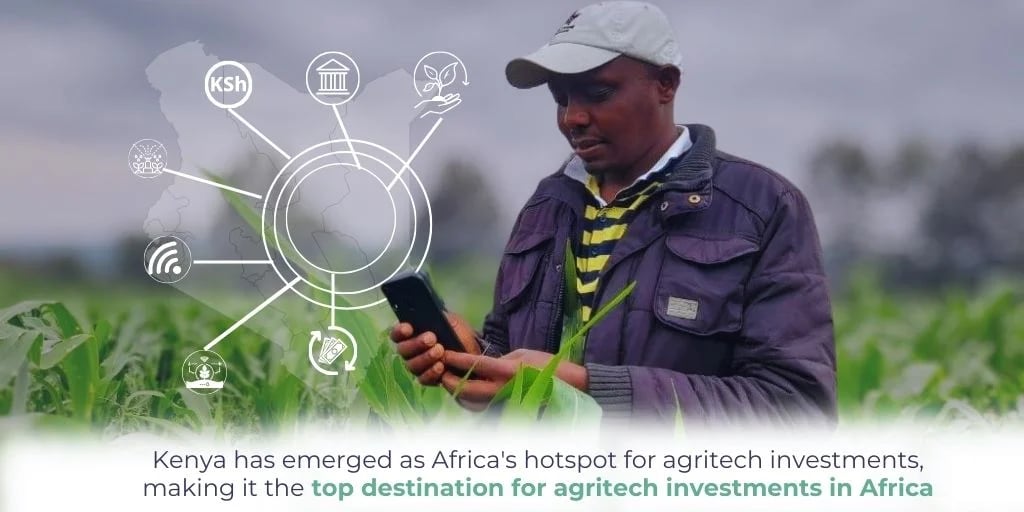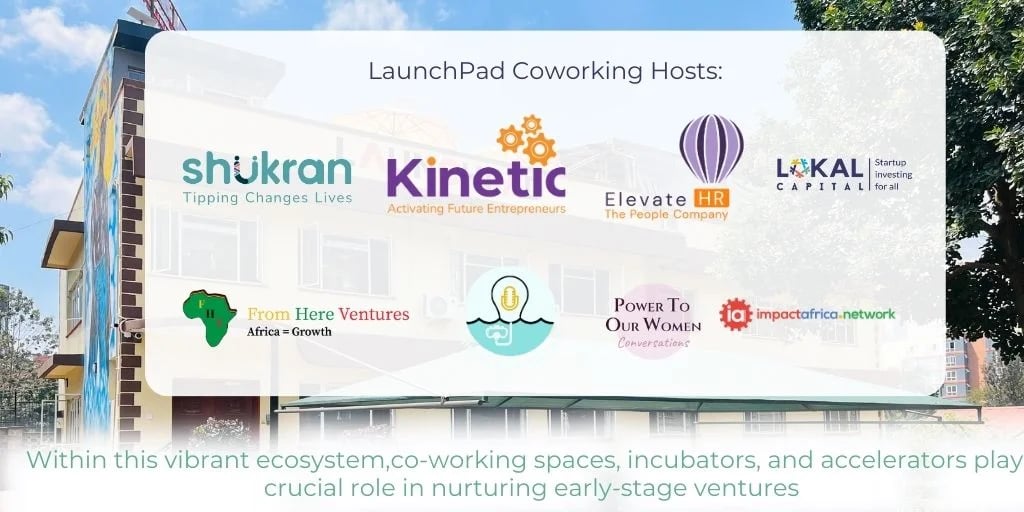Introduction
The Kenyan startup ecosystem is experiencing a transformative wave of investment trends in 2024. This blog post explores the latest trends in local startup investments, shedding light on emerging sectors that show particular promise for investors and entrepreneurs. For a retrospective view of the Kenyan startup landscape in 2023, you can check out our Kenyan Startup Ecosystem Report 2023
1. Fintech Companies in Kenya Continue to Shine

The Kenyan fintech sector is experiencing remarkable growth, with a strong focus on mobile banking, digital lending, and cutting-edge payment solutions. According to a report by Fintech Global, fintech deal activity in Kenya reached 48 deals in total during 2022, a 14% increase from 2021 levels. Additionally, fintech investment in the country set a new record in 2022, with companies raising $158 million, a more than three-fold increase from 2021. Nairobi accounted for 87% of fintech deals in Kenya during 2022, with 41 in total
One notable example of a fintech company making an impact in Kenya is Shukran, a digital tipping partner for service workers. Shukran provides a banking solution for service workers, offering a tipping platform that allows them to not only receive tips but also save them in the Shukran Sacco. This innovative approach to financial services is contributing to the overall vibrancy of Kenya's diverse startup ecosystem, highlighting the transformative power of fintech in the country
2. Healthtech for Improved Access
Kenya's healthcare sector is witnessing a surge in investment, particularly in Healthtech. This dynamic fusion of innovation and healthcare is reshaping the landscape of angel investing and venture capital. Healthtech startups in Kenya are harnessing the power of technology to enhance healthcare accessibility, facilitate telemedicine services, and streamline medical record management.
The unprecedented challenges posed by the pandemic back in 2022 has acted as a catalyst, propelling healthtech into the spotlight as a highly promising sector for investors seeking meaningful impact. As angel investors and venture capitalists explore new horizons, the intersection of technology and healthcare stands out as a beacon of opportunity within Kenya's diverse startup terrain.
3. Edtech Revolution

The education technology (edtech) sector in Kenya continues to undergo a remarkable surge in growth . Within the vibrant landscape of edtech in Kenya, a multitude of startups and edtech companies are innovating and building brilliant edtech products to enhance the educational experience. This flourishing sector not only caters to the evolving needs of a diverse student population but also aligns with a broader trend of embracing educational technology.
The demand for online education solutions is also a driving catalyst in this sector , especially within a rapidly growing youth demographic, edtech companies in Kenya find themselves at the forefront, ready to shape the future of education in the country. The projection for Kenya's education sector indicates substantial growth, with an estimated 9.71% increase from 2022 to 2027, reaching a market volume of US$2.76 million in 2027.
Across Africa, there are over 500 EdTech startups, contributing to this upward trajectory by offering a diverse range of services. One exemplary player in the Kenyan EdTech landscape is Kinetic Education. Renowned for its immersive, practical learning experiences, Kinetic Education stands as a leading edtech solution, strategically designed to equip students for success in the 21st century. This innovative company is transforming the educational landscape through its entrepreneurship learning and a cutting-edge edtech platform.
Looking ahead, the future of the African EdTech industry appears promising, fueled by increased investment, and a growing demand for digital skills in the job market. As the EdTech ecosystem continues to evolve, it is poised to play a crucial role in shaping the educational narrative not only in Kenya but across the continent.
4. Agritech's Sustainable Growth

The agritech sector in Kenya is thriving and has become a focal point for investment, attracting attention from investors keen on supporting sustainable initiatives. According to a report by Fitch Solutions, Kenya has emerged as Africa's hotspot for agritech investments, making it the top destination for agritech investments in Africa. The agricultural sector in Kenya employs more than 80% of the country's rural workforce and contributes to 28% of the gross domestic product (GDP), with 65% of total export earnings. The crop, livestock, and fishery sub-sectors contribute approximately 78%, 20%, and 2% to the agricultural GDP, respectively.
The Oxford Business Group reports that the accelerating uptake of agritech and new means of crop production and distribution has begun to change smallholder farming in Kenya. The agritech startups in Kenya are championing transformative solutions across the agricultural landscape, pioneering advancements in precision agriculture, revolutionizing supply chain management, and enhancing market access for farmers. The robust performance of the agritech sector is playing a vital role in fostering sustainable growth, ensuring a resilient future for both the agricultural sector and the nation as a whole
5. Renewable Energy Solutions
Renewable energy startups are contributing to Kenya's goal of achieving energy sustainability. The renewable energy startup scene in Kenya is gaining momentum, with a growing number of startups focused on providing innovative solutions to address the country's energy challenges, such as solar power solutions, clean cooking technologies, and energy-efficient appliances.
The fintech sector in Kenya is playing a pivotal role in financing clean energy startups, with venture capital investment in energy startups based in Africa reaching over USD 130 million in 2022. One notable example of a startup making an impact in the renewable energy sector is M-KOPA, which provides pay-as-you-go solar energy solutions to off-grid households in Kenya. The company has raised over $100 million in funding and has connected over 1 million homes to solar power. Investment in this sector aligns with global trends towards innovative, cleaner, and greener energy alternatives.
6. Proximity Services
Startups offering on-demand services, often referred to as "proximity services," are gaining traction in urban areas. These platforms connect consumers with local service providers, ranging from home maintenance to beauty services. The convenience and potential for job creation make this sector promising for investors.
The proximity services sector is emerging as a promising venture for investors This dynamic and evolving landscape is attracting entrepreneurs and investors, making Nairobi a leading tech innovation hub in sub-Saharan Africa. The growth and innovation in these sectors are contributing to the overall vibrancy of Kenya's startup ecosystem, with the potential to shape the future of various industries in the country.
7. Inclusive Fintech for SMEs
In recent years, there has a notable surge in investments directed towards fintech startups focusing on small and medium-sized enterprises (SMEs). These forward-thinking solutions go beyond the conventional, offering a suite of financial services, streamlined credit access, and tailored business management tools. Their impact on SMEs is not just beneficial but crucial for driving economic growth.
Kenya's journey towards financial inclusion has been nothing short of remarkable over the past decade. The latest World Bank Global Findex Report highlights this progress, with an impressive 79% of Kenyan adults now holding bank accounts, a significant leap from the 42% recorded in 2011. This transformation is largely attributed to the widespread adoption of mobile money, a game-changer that has made financial services accessible to millions.
In this landscape of progress, fintech startups in Kenya emerge as key contributors to advancing financial inclusion. Their pivotal role goes beyond conventional practices, as they actively drive positive change and foster economic growth. By revolutionizing financial services, improving credit accessibility, and promoting financial health, these startups are not just transforming the financial sector but also shaping a more inclusive and prosperous economic future for Kenya.
8. Impact Investments
Investors are increasingly drawn to startups with a focus on social and environmental impact. Impact investing is gaining momentum, with startups addressing issues like climate change, sustainable agriculture, and financial inclusion receiving considerable funding. Investors are increasingly drawn to startups with a focus on social and environmental impact, with impact investing gaining momentum in Kenya.
The vibrant impact investing landscape in Kenya is marked by a high number of impact investment opportunities, with 76 out of 111 deals across East Africa being in Kenya. Moreover, the market boasts of 136 impact capital vehicles managed by 95 private impact investors, highlighting the scale of the landscape. Impact investing in Kenya is driven by a strong emphasis on mobile technology and a favourable regulatory environment.
The country is home to a wide range of impact investment opportunities, across a variety of sectors, including agriculture, renewable energy, and proximity services. Fintech startups in Kenya are also playing a pivotal role in promoting financial inclusion in the country, with impact investors keen on supporting sustainable initiatives. These startups are revolutionizing financial services, improving access to credit, and promoting financial health. The impact investing landscape in Kenya is contributing to the overall vibrancy of Kenya's diverse startup ecosystem, highlighting the transformative power of impact investments in promoting social and environmental impact in the country
9. Early-Stage Funding Ecosystem

The thriving Kenyan startup ecosystem is experiencing a notable uptick in early-stage investors, along with the emergence of supportive incubators and accelerators. This dynamic landscape is a boon for startups, offering them a crucial avenue to secure essential funding and receive valuable support, propelling their ventures to new heights.
Successful entrepreneurs navigating this landscape often adopt a strategic approach, leveraging a diverse mix of funding sources. From Here VC stands out as an exemplary model in this regard, functioning as an early-stage venture fund that not only deploys capital but also provides a comprehensive suite of support capabilities. This support is dedicated to exceptional entrepreneurs actively shaping transformative companies across Africa.
The rapid evolution of the Kenyan startup ecosystem is fueled by multiple factors, including increased talent, budding entrepreneurs, burgeoning local angel investors, and a government policy that actively supports entrepreneurship and innovation. Within this vibrant ecosystem, numerous co-working spaces, incubators, and accelerators play a crucial role in nurturing early-stage ventures. Impact Africa Network and LaunchPad Innovation Campus coworking Space are notable contributors, providing essential support to entrepreneurs embarking on their transformative journeys. The synergy of these elements reflects the resilience and potential of the Kenyan startup ecosystem as it continues to forge ahead in the realm of innovation and entrepreneurship.
10. Collaboration and Partnerships
Investment trends also point to a growing spirit of collaboration and partnerships within the ecosystem. Startups are increasingly teaming up with established companies to leverage their resources and networks, and investors are recognizing the value of such collaborations.
11. Cross-Border Investment
Kenyan startups are not only attracting local investments but are also making their mark on the global stage. They are participating in international events, gaining exposure to global markets, and securing funding from international investors.
In conclusion, the investment landscape in Kenya's startup ecosystem in 2023 is marked by exciting opportunities in sectors such as fintech, healthtech, edtech, agritech, and renewable energy. Investors are also focusing on social and environmental impact, supporting early-stage ventures, and nurturing collaboration within the ecosystem. As Kenya's startup ecosystem continues to evolve, it offers a promising landscape for both local and international investors and entrepreneurs.
.jpg)


